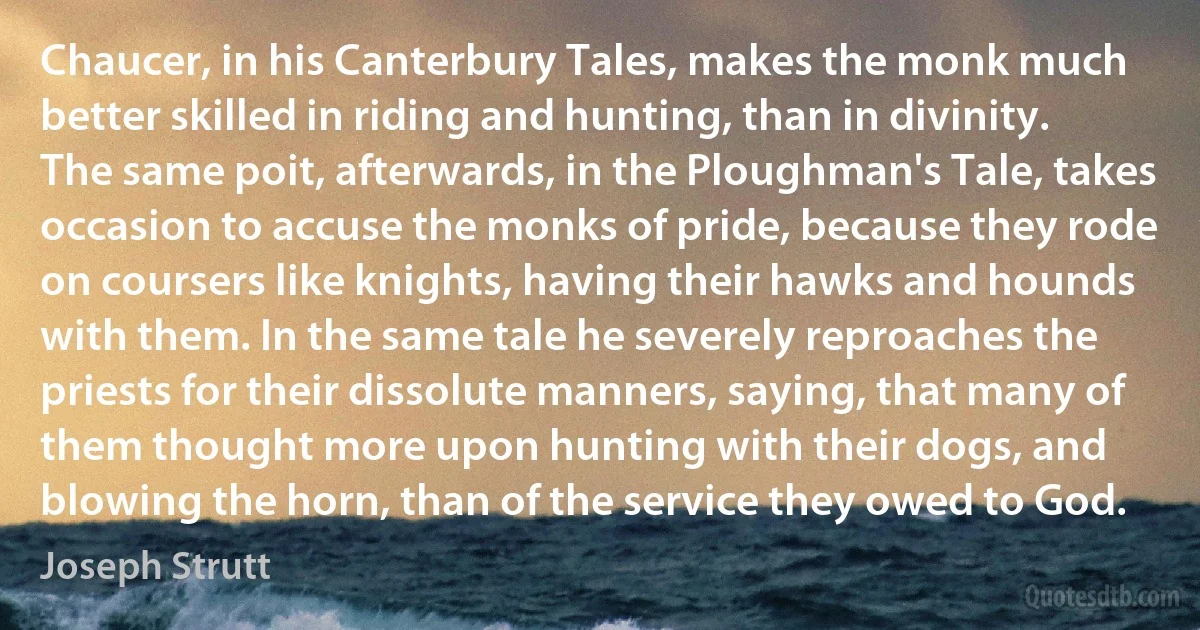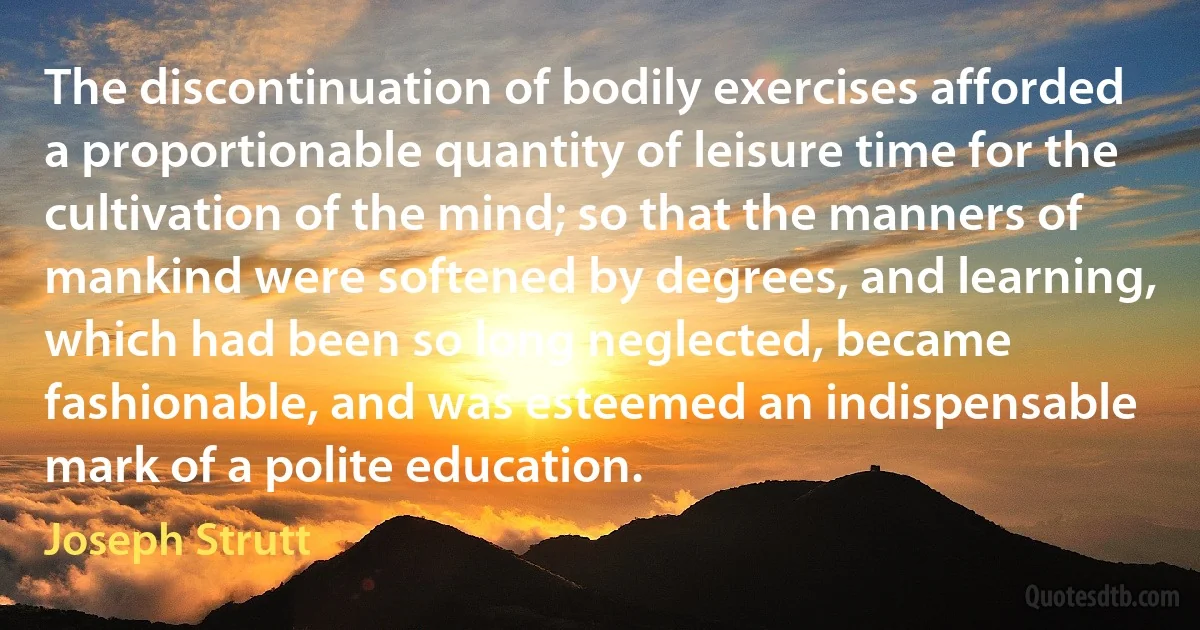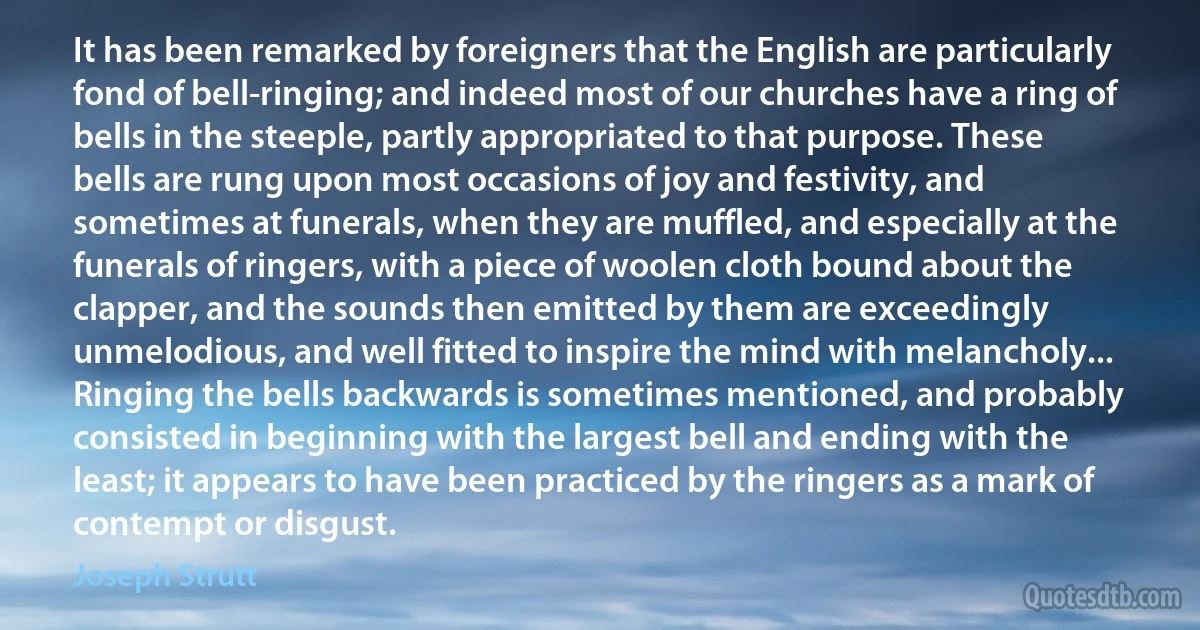Joseph Strutt quotes
Under queen Elizabeth, the minstrels had lost the protection of the opulent; and their credit was sunk so low in the public estimation, that, by a statute in the thirty-ninth year of her reign against vagrants, they were included among the rogues, vagabonds, and sturdy beggars, and subjected to the like punishments. This edict also affected all fencers, bearwards, common players of interludes (with the exception of such players as belonged to great personages, and were authorised to play under the hand and seal of their patrons), as well as minstrels wandering abroad, jugglers, tinkers, and pedlars; and seems to have given the death's wound to the profession of the minstrels, who had so long enjoyed the public favour, and basked in the sunshine of prosperity.

Joseph Strutt
One great part of the joculator's profession was the teaching of bears, apes, horses, dogs, and other animals, to imitate the actions of men, to tumble, to dance, and to perform a variety of tricks, contrary to their nature; and sometimes he learned himself to counterfeit the gestures and articulations of the brutes.

Joseph Strutt
Among the vices of the Anglo-Saxons may be reckoned their propensity to gaming, and especially with the dice, which they derived from their ancestors; for Tacitus assures us that the ancient Germans could not only hazard all their wealth, but even stake their liberty, upon the turn of the dice; "and he who loses," says the author, "submits to servitude, though younger and stronger than his antagonist, and patiently permits himself to be bound, and sold in the market; and this madness they dignify by the name of honour."

Joseph Strutt
These selfish professors of religion [monks] grudged every act of munificence that was not applied to themselves, or their monasteries; and could not behold the good fortune of the minstrels without expressing their indignation; which they often did in terms of scurrilous abuse, calling them janglers, mimics, buffoons, monsters of men, and comtemptible scoffers. They also severely censured the nobility for patronizing and rewarding such a shameless set of sordid flatterers, and the populace for frequenting their exhibitions, and being delighted with their performances, which diverted them from more serious pursuits, and corrupted their morals. On the other hand, the minstrels appear to have been ready enough to give them ample occasion for censure; and, indeed, I apprehend that their own immorality and insolence contributed more to their downfal, than all the defamatory declamations of their opponents.

Joseph Strutt
And here I cannot help mentioning a very ridiculous show of a learned pig, which of late days attracted much of the public notice, and at the polite end of the town. This pig, which indeed was a large unwieldy hog, being taught to pick up letters written upon pieces of cards, and to arrange them at command, gave great satisfaction to all who saw him, and filled his tormenter's pocket with money. One would not have thought that a hog had been an animal capable of learning: the fact, however, is another proof of what may be accomplished by assiduity; for the showman assured a friend of mine, that he had lost three very promising brutes in the course of training, and that the phenomenon then exhibited had often given him reason to despair of success.

Joseph Strutt
It is indeed said that Edmund, king of the East Angles, was shot to death with arrows by the Danes; but, if this piece of history be correct, it is no proof that they used the bow as a weapon of war. The action itself might be nothing more than a wanton piece of cruelty; and cruelty seems to have been a prominent feature in the character of those lawless plunderers.

Joseph Strutt
The chimney-sweepers of London have also singled out the first of May for their festival; at which time they parade the streets in companies, disguised in various manners. Their dresses are usually decorated with gilt paper, and other mock fineries; they have their shovels and brushes in their hands, which they rattle one upon the other; and to this rough music they jump about in imitation of dancing.

Joseph Strutt
In a paper belonging to the Spectator there is a short description of a country wake. "I found," says the author, "a ring of cudgel-players, who were breaking one another's heads in order to make some impression on their mistresses' hearts."...to this he adds another curious pastime, as a kind of Christmas gambol, which he had seen also; that is, a yawning match for a Cheshire cheese; the sport began about midnight, when the whole company were disposed to be drowsy; and he that yawned the widest, and at the same time most naturally, so as to produce the greatest number of yawns from the spectators, obtained the cheese.

Joseph Strutt
In the Roman de la Rose, we read of a dance, the name of which is not recorded, performed by two young women lightly clothed. The original reads, "Qui estoient en pure cottes, et tresses a menu tresse;" which Chaucer renders, "In kyrtels, and none other wede, and fayre ytressed every tresse." The French intimates that their hair was platted, or braided in small braids. The thin clothing, I suppose, was used then, as it is now upon like occasions, to show their persons to greater advantage. In their dancing they displayed a variety of singular attitudes; the one coming as it were privately to the other, and, when they were near together, in a playsome manner they turned their faces about, so that they seemed continually to kiss each other.

Joseph Strutt
The people of Sybaris, a city in Calabria, are proverbial on account of their effeminancy; and it is said that they taught their horses to dance to the music of the pipe; for which reason, their enemies the Crotonians, at a time when they were at war with them, brought a great number of pipers into the field, and at the commencement of the battle, they played upon their pipes; the Sybarian horses, hearing the sound of the music, began to dance; and their riders, unable to manage them as they ought to have done, were thrown into confusion, and defeated with prodigious slaughter. This circumstance is mentioned by Aristotle; and, if not strictly true, proves, at least that the teaching of animals to exceed the bounds of action prescribed by nature was not unknown to the ancients.

Joseph Strutt
The general decay of those manly and spirited exercises, which formerly were practiced in the vicinity of the metropolis has not arisen from any want of inclination in the people, but from the want of places proper for the purpose: such as in times past had been allotted to them are now covered with buildings, or shut up by enclosures, so that, if it were not for skittles, dutch-pins, four-corners, and the like pastimes, they would have no amusements for the exercise of the body; and these amusements are only to be met with in places belonging to common drinking-houses, for which reason their play is seldom productive of much benefit, but more frequently becomes the prelude to drunkenness and debauchery. This evil has been increasing for a long series of years; and honest Stow laments the retrenchments of the grounds appropriated for martial pastimes which had begun to take place in his day.

Joseph Strutt
I may just add, that in addition to the hand-guns, I meet with other instruments of like kind mentioned in the reign of Elizabeth, namely, demy hags, or hag butts. They shot with these engines not only at butts and other dead marks, but also at birds and beasts, using sometimes bullets and sometimes half shots; but in the beginning of the seventeenth century the word artillery was used in a much more extensive sense, and comprehended long-bows, cross-bows, slur-bows, and stone-bows; also scorpions, rams, and catapults, which, the writer tells us, were formerly used; he then names the fire-arms as follows, cannons, basilisks, culverins, jakers, faulcons, minions, fowlers, chambers, harguebusses, calivers, petronils, pistols, and dags. "This," says he, "is the artillerie which is nowe in the most estimation, and they are divided into great ordinance, and into shot or guns," which proves that the use of fire-arms had then in great measure superseded the practice of archery.

Joseph Strutt
The mere management of arms, though essentially requisite, was not sufficient of itself to form an accomplished knight in the times of chivalry; it was necessary for him to be endowed with beauty, as well as with strength and agility of body; he ought to be skilled in music, to dance gracefully, to run with swiftness, to excel in wrestling, to ride well, and to perform every other exercise befitting his situation. To these were to be added urbanity of manners, strict adherence to the truth, and invincible courage. Hunting and hawking skilfully were also acquirements that he was obliged to possess, and which were usually taught him as soon as he was able to endure the fatigue that they required.

Joseph Strutt
The national passion for secular music admitted of little or no abatement by the disgrace and dispersion of the minstrels. Professional musicians, both vocal and instrumental, were afterwards retained at the court, and also in the mansions of the nobility. In the sixteenth century, a knowledge of music was considered as a genteel accomplishment for persons of high rank. Henry VIII not only sang well, but played upon several sorts of instruments; he also wrote songs, and composed the tunes for them; and his example was followed by several of the nobility, his favourites.

Joseph Strutt
I have seen a man in London, who I believe is now living, ring twelve bells at one time; two of them were placed upon his head, he held two in each hand, one was affixed to each of his knees, and two upon each foot; all of which he managed with great adroitness, and performed a vast variety of tunes.

Joseph Strutt
It has before been observed that this author is very severe upon most of the popular sports; but in justice to him I may add, that similar complaints have been exhibited against the church-ales and wakes in times greatly anterior to his existence. And, indeed, if we look at the wakes and fairs as they are conducted in the present day, I trust we shall not hesitate to own that they are by no means proper schools for the improvement of the public morals.

Joseph Strutt
Shove-groat, named also Slyp-groat, and Slide-thrift, are sports occasionally mentioned by the writers of the sixteenth and seventeenth centuries, and probably were analogous to the modern pastime called Justice Jervis, or Jarvis, which is confined to common pot-houses, and only practiced by such as frequent the tap-rooms.

Joseph Strutt



